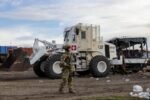Siniša Karan, a close ally of the ousted Republika Srpska leader Milorad Dodik, has won the snap presidential election in the Serb-majority entity of Bosnia and Herzegovina. According to preliminary results released before midnight by the Central Election Commission, Karan secured 50.89% of the vote, narrowly defeating opposition candidate Branko Blanuša, who received 47.81%.
The election—held after Dodik was removed from office in August for defying the decisions of High Representative Christian Schmidt—was widely viewed as a crucial test of support for Dodik’s nationalist project, backed openly by Belgrade and President Aleksandar Vučić’s regional political machine.
Analysts argue that the outcome reflects the continued entrenchment of hardline, Serbia-aligned power structures inside Republika Srpska, despite Dodik’s six-year ban from holding public office following his conviction for obstructing the international oversight body that safeguards Bosnia’s fragile peace.
The vote took place amid years of escalating confrontation between Dodik and the Office of the High Representative—a clash that many experts say has pushed the country to the brink of its most serious political crisis since the 1992–1995 war.
Karan, promoted throughout the campaign as the continuation of Dodik’s political legacy, appeared alongside Dodik at the final rally on Thursday. During the event, Dodik—who has repeatedly questioned Bosnia’s viability—pledged that the push for the “statehood” of Republika Srpska would continue.
“Our vision is freedom, and there is no freedom without a state,” Dodik told supporters in Banja Luka.
Opposition candidate Blanuša sharply criticized Dodik’s rule, accusing him of corruption, political destabilization, and dragging the entity into isolation. “He has humiliated RS institutions for his personal wealth and interests,” Blanuša told voters earlier this week.
Dodik, whose political survival has long relied on support from Moscow and quiet backing from Vučić’s government in Belgrade, initially ignored the High Representative’s decision but unexpectedly accepted it in October—a move many observers interpreted as a tactical retreat rather than a real shift in strategy.
Polling stations opened at 07:00 and closed at 19:00, with turnout reaching about 35.7% of the 1.2 million eligible voters. Karan will serve less than a year, until Bosnia’s general elections in October 2026.
The result reinforces concerns that Belgrade’s influence—particularly through Vučić’s network of nationalist allies—continues to undermine stability, embolden secessionist narratives, and weaken Bosnia’s already fragile institutional structure.







